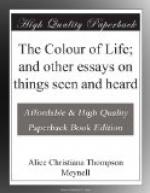But his suburbs shall not, if he can help it, be grass-grown. They shall not be like a mere Pisa. Highgate shall not so, nor Peckham.
A WOMAN IN GREY
The mothers of Professors were indulged in the practice of jumping at conclusions, and were praised for their impatience of the slow process of reason.
Professors have written of the mental habits of women as though they accumulated generation by generation upon women, and passed over their sons. Professors take it for granted, obviously by some process other than the slow process of reason, that women derive from their mothers and grandmothers, and men from their fathers and grandfathers. This, for instance, was written lately: “This power [it matters not what] would be about equal in the two sexes but for the influence of heredity, which turns the scale in favour of the woman, as for long generations the surroundings and conditions of life of the female sex have developed in her a greater degree of the power in question than circumstances have required from men.” “Long generations” of subjection are, strangely enough, held to excuse the timorousness and the shifts of women to-day. But the world, unknowing, tampers with the courage of its sons by such a slovenly indulgence. It tampers with their intelligence by fostering the ignorance of women.
And yet Shakespeare confessed the participation of man and woman in their common heritage. It is Cassius who speaks:
“Have you not love enough
to bear with me
When that rash humour which my mother
gave me
Makes me forgetful?”
And Brutus who replies:
“Yes, Cassius, and from henceforth
When you are over-earnest with your
Brutus
He’ll think your mother chides,
and leave you so.”
Dryden confessed it also in his praises of Anne Killigrew:
“If by traduction came thy
mind,
Our wonder is the less to find
A soul so charming from a stock
so good.
Thy father was transfused into thy
blood.”
The winning of Waterloo upon the Eton playgrounds is very well; but there have been some other, and happily minor, fields that were not won—that were more or less lost. Where did this loss take place, if the gains were secured at football? This inquiry is not quite so cheerful as the other. But while the victories were once going forward in the playground, the defeats or disasters were once going forward in some other place, presumably. And this was surely the place that was not a playground, the place where the future wives of the football players were sitting still while their future husbands were playing football.




